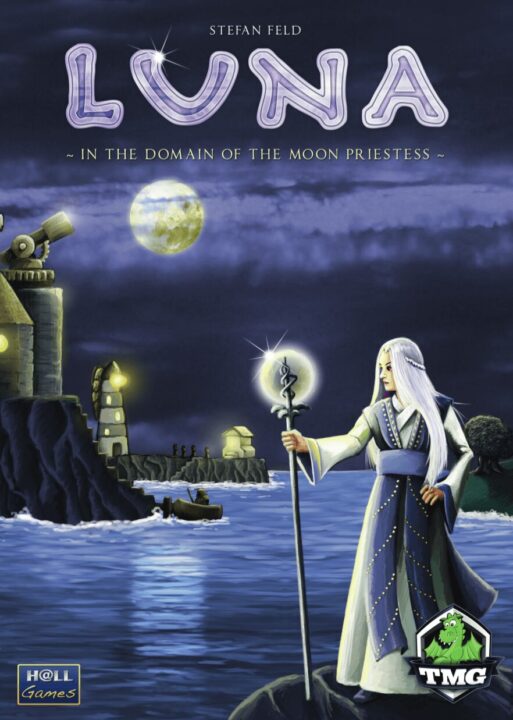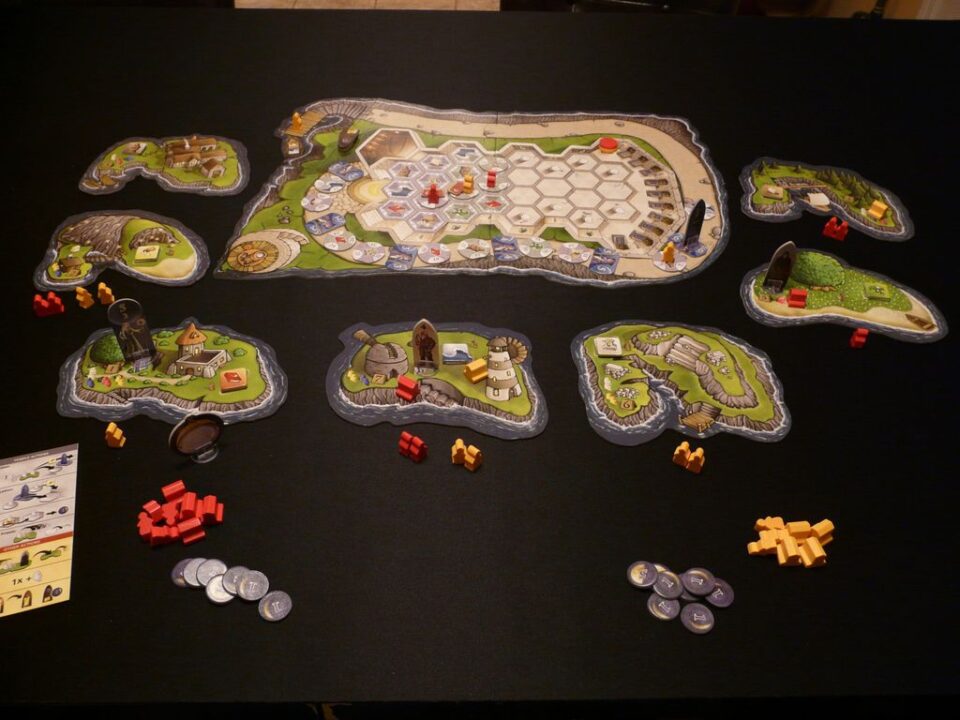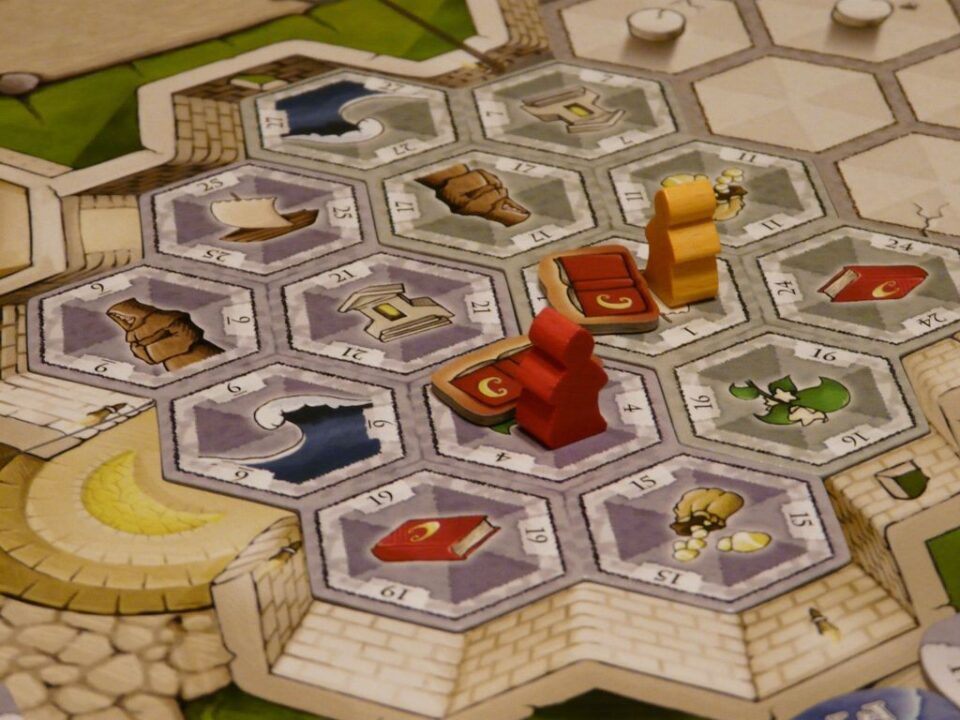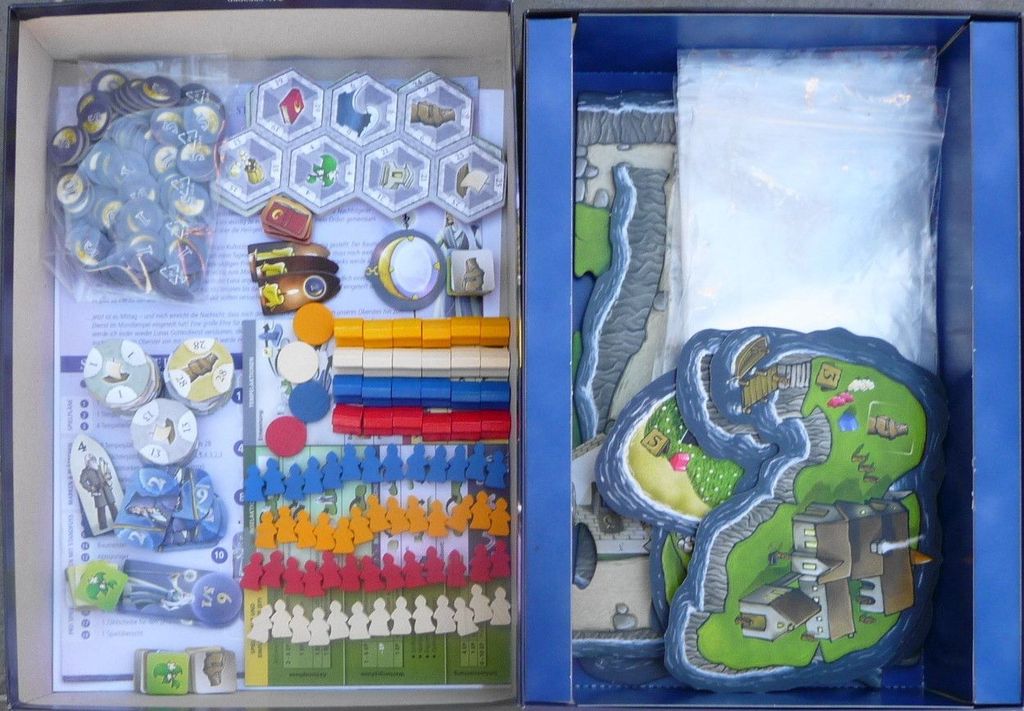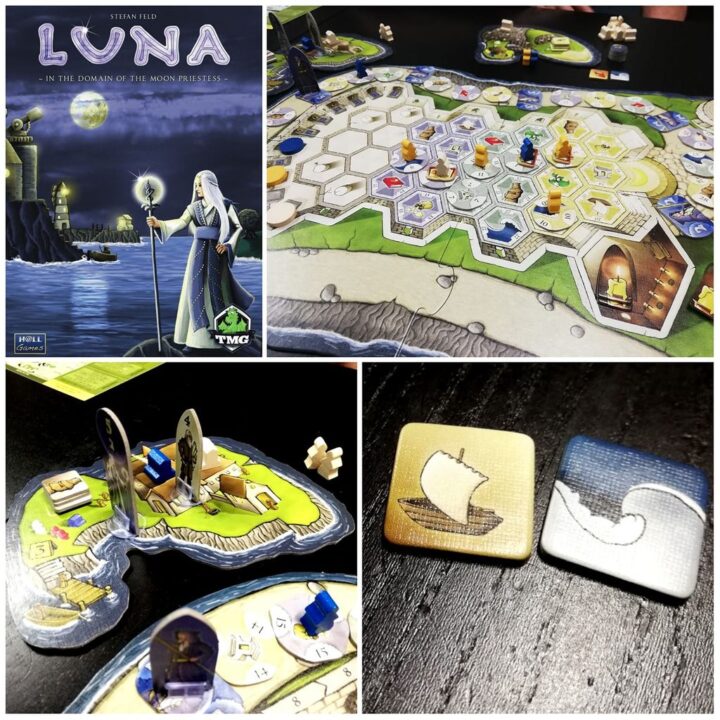Overview
Hey there, fellow game lovers! Jamie here, bringing you the lowdown on a gem of a board game called Luna. In this review, I’ll take you through the ins and outs, from the mesmerizing artwork that’ll catch your eye to the brain-tickling mechanics that’ll keep you coming back for more. So, grab your token, and let’s see if Luna earns a prized spot on your game shelf!
How It Plays
Setting Up
First off, setting up Luna is like preparing for a moon festival. You spread out the island tiles in the middle, creating the sacred island. Each player picks a color and gets their matching pieces. Put the temple tiles, favor tokens, and time tokens nearby. It’s a bit of work but think of it as laying down the red carpet for a grand event. Your followers (meeples) can hardly wait to start worshipping!
Gameplay
The heart of Luna is about sending your followers to various islands to perform tasks, like gathering resources or gaining favors from the gods. It’s a bit like organizing a big party where everyone has a job. Each turn, you choose where to send your followers, aiming to gain the most influence. But watch out, the High Priestess is on a move, and her location affects your actions big time. It’s a constant juggle, like trying to bake a cake while teaching your dog to dance.
Winning the Game
To win at Luna, you need to have the most points when the game ends. Points come from your influence on islands, your standing in the temple, and the favors you’ve collected. Think of it as being crowned the Moon Festival King or Queen. Everyone wants the title, but only the player who’s managed their followers and resources with the grace of a moon goddess takes the crown.
Want to know more? Read our extensive strategy guide for Luna.
Exploring the Tactical Depths of Luna’s Gameplay Mechanics
When you sit down to play Luna, you’re not just playing a board game; you’re embarking on a strategic pilgrimage full of twists and turns. The game mechanics in Luna are a blend of area control, worker placement, and time management that keeps you on your toes. Each player represents a head of a Moon Priestess’s order, aiming to gain her favor through various actions like building temples, recruiting novices, or worshipping in the temple.
The flow of the game is smooth yet requires deep tactical thinking. One of Luna’s standout features is the ‘Island tiles’ mechanic, where islands are arranged differently each game, leading to a unique experience every time. Choices feel meaningful, and the tension of optimizing your actions without letting opportunities slip for your opponents creates an engaging gameplay loop. Timing is critical, and planning your moves while anticipating others’ actions showcases Luna at its best.
Next, let’s shift our focus to the visual feast Luna presents, highlighting the artwork and component quality.
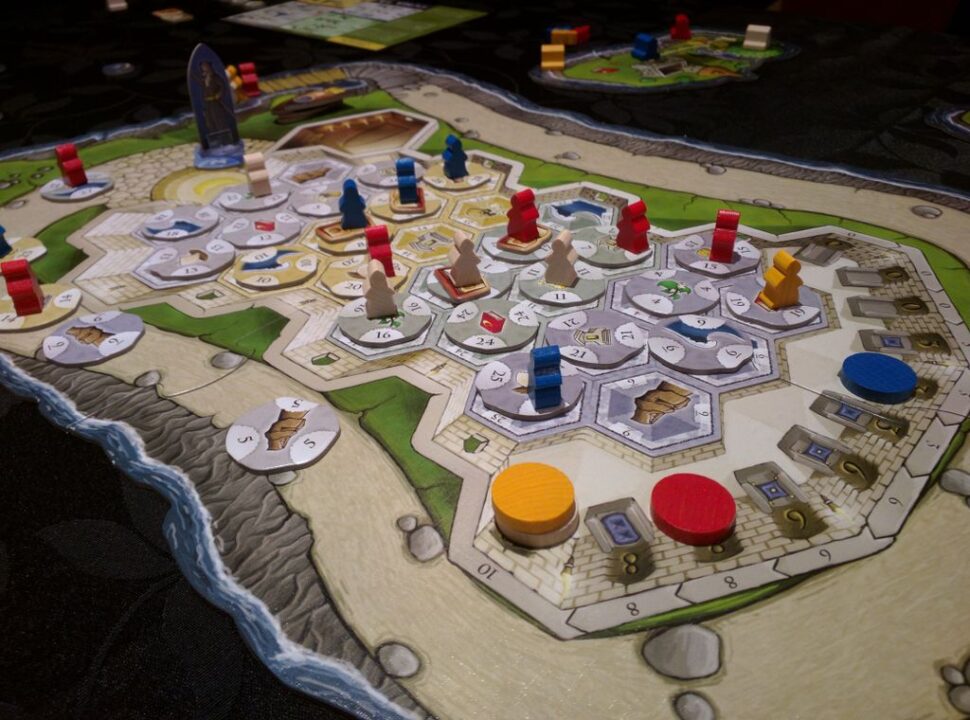
Stunning Visuals and Top-Notch Materials in Luna
Luna is not just a feast for the brain with its heavy strategy; it’s also a feast for the eyes. The moment you open the box, you’re greeted with artwork that’s nothing short of stunning. The game’s theme, set in a mystical moon temple, comes to life through vibrant and detailed illustrations. Each piece, from the tiles to the character tokens, is designed with care, enhancing the overall magical atmosphere of the game.
But Luna isn’t just about pretty pictures. The component quality is top-notch. Thick, durable tiles and tokens ensure that Luna can withstand countless gaming sessions without showing wear and tear. The attention to detail in both design and durability clearly shows the creators’ dedication to delivering a premium gaming experience. This combination of beautiful artwork and sturdy components makes Luna stand out in the crowded board game market.
As we marvel at Luna’s visual and material charm, it’s time to shift gears and tackle the brainy part of the game: Strategy depth and learning curve.
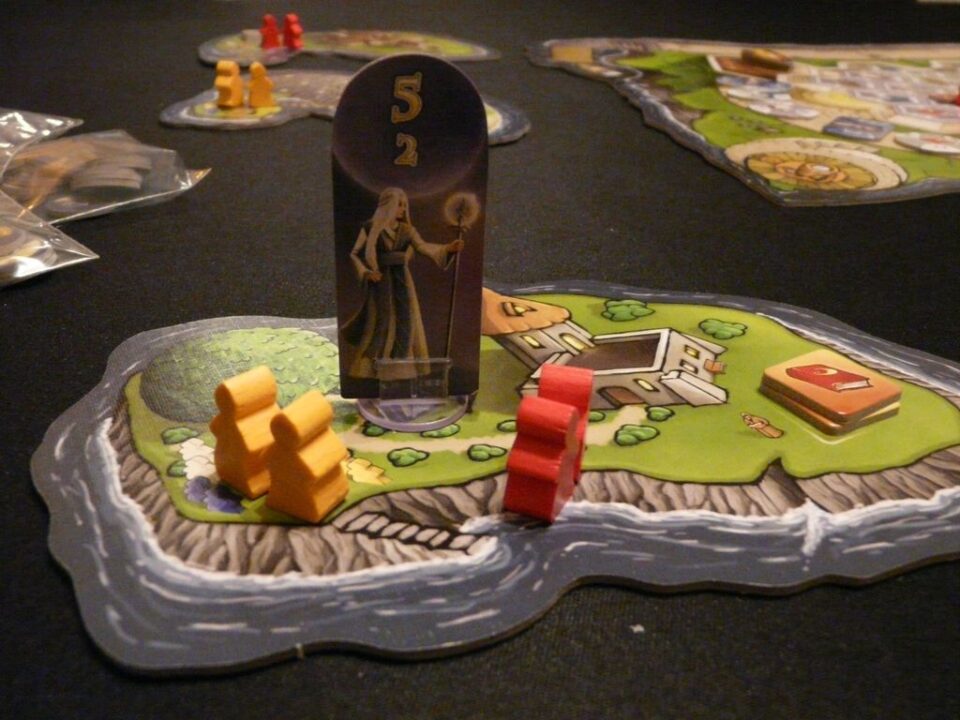
Mastering Luna’s Strategic Nuances
Luna’s strategy isn’t just deep; it’s like diving into an ocean full of clever gameplay options and tactical turns. At first, the learning curve feels like you’re climbing a mountain backwards. But once you get the hang of it, you’re rewarded with an exhilarating experience every time you play. Luna demands careful planning, foresight, and adaptation to opponents’ moves. It’s not the kind of game where you can wing it and hope for the best. Players must balance their immediate needs with long-term goals, making every decision count.
The interplay between different strategies adds richness to Luna, allowing for a variety of approaches. Whether you’re focusing on temple influence, island control, or timing your actions perfectly, there’s always a new tactic to explore. This strategic depth ensures that Luna remains engaging and challenging even after numerous plays.
Now, let’s set sail to the enchanting realm of Replay value and player interaction, where Luna truly shines.
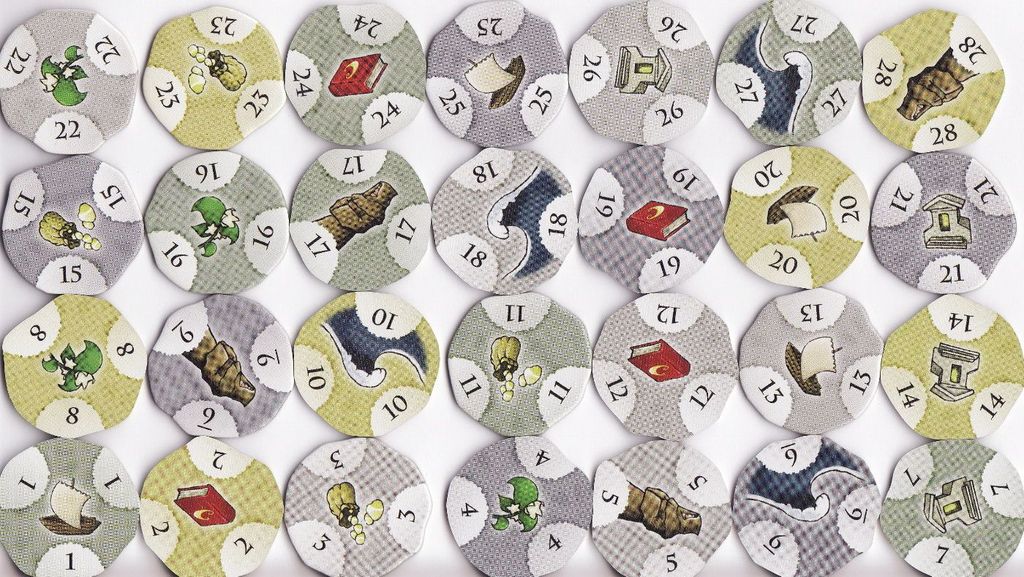
Unlocking the Secrets of Replayability and Player Dynamics in Luna
Luna’s magic doesn’t just lie in its gorgeous artwork or intricate mechanics; it blooms brilliantly in its replay value and player interaction. Each game unfurls new strategies and paths to victory, ensuring no two games feel the same. You think you’ve got it all figured out, then bam, your buddy pulls a move you didn’t see coming. The tension and collaboration between players keep you on your toes, making each playthrough as exciting as the last.
But it’s not just about outsmarting your opponents. Luna demands you adapt and plan with the shifting tides of your fellow players’ actions. The interaction isn’t just competitive; it’s a dance – sometimes you lead, sometimes you follow. The game’s design encourages players to reconsider their strategies constantly, ensuring the replay value stays sky-high.
If you’re looking for a game that keeps giving back, Luna is a stellar choice. I wholeheartedly recommend it.
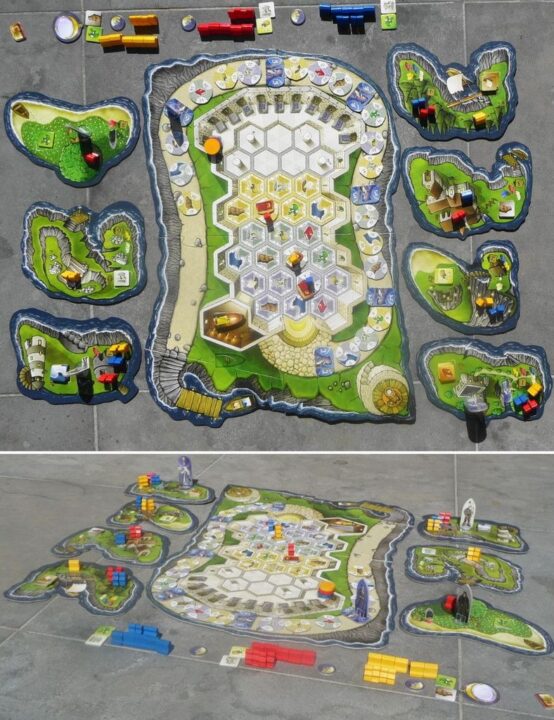
Conclusion
Wrapping up, Luna is a beautifully crafted board game that stands out in both art and mechanics. It strikes a perfect balance between deep strategy and a learning curve that’s steep, but rewarding. Not only does it provide a solid gameplay experience with its unique combination of area control and worker placement, but it also shines with stunning visuals and top-notch components. The game’s high replay value and engaging player interaction mean you’ll be coming back to the island of Luna time and time again. Despite its complexity, Luna is a gem worth exploring for those who relish strategic depth and aesthetic pleasure in their board games. Highly recommended for a spot on your game shelf!

